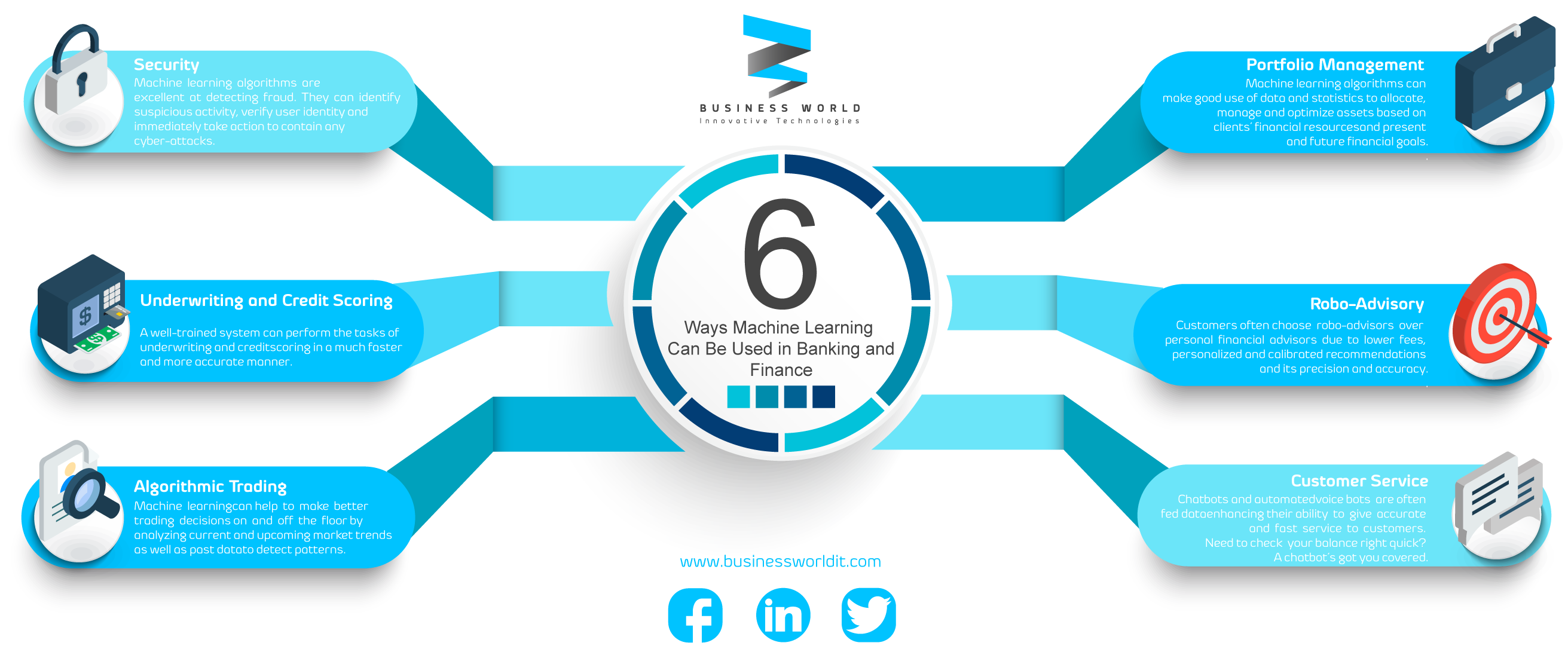
Machine Learning (ML) is a subset of data science that uses statistical models to draw insights and make predictions based on past records of data.
How is machine learning different from artificial intelligence? Machine learning solutions learn from experience and do not need to be explicitly programmed. Users only need to select the models and feed it with data, and it will work on its own to improve the outcomes.
In these modern times, one of the best applications of machine learning in finance and banking sectors. Machine learning works better as more and more data is fed into the algorithms.
The financial services industry has enormous datasets that are very common. Billions of dollars pass through financial wires each day and with it goes customer information. There are terabytes of data on transactions, customers, bills, money transfers, and so forth. This makes it a perfect fit for machine learning.
Here are 6 Ways Machine Learning Can be Used in Banking and Finance:
Security
Security threats in finance are ever-increasing. Therefore, it is imperative that User transactions and user data are secure and protected. Machine learning algorithms are excellent at detecting frauds – they can identify suspicious activity, verify user identity, and immediately take actions to contain any cyber-attacks.
Data scientists can also train the system to flag money laundering attempts, spot, and isolate cyber threats. Companies such as Adyen, Payoneer, PayPal, Stripe, and Skrill invest heavily in security machine learning.
Underwriting and Credit Scoring
Underwriting is the process that banks and other financial institutions use to assess the creditworthiness or risk of a potential borrower.
A well-trained system can then perform these underwriting and credit-scoring tasks in a much faster and more accurate manner.
Algorithmic Trading
Machine learning, as would be quite obvious, helps to make better trading decisions by analyzing the market trends and past data.
A mathematical model monitors the news and trade results in real-time and detects patterns that can force stock prices to go up or down. It can prompt or influence decisions on whether to sell, hold, or buy stocks according to its predictions. One major advantage that machine learning has is that it can analyze multiple data sets simultaneously and draw inferences instantly – something humans can never do.
Portfolio Management
One of the most important financial services that one can avail of is portfolio management. Machine learning algorithms can make use of data and statistics to allocate, manage, and optimize clients’ assets based on their financial resources, present situation and financial goals. Machine learning ensures that clients achieve their desired ROI through the most optimum investments, both equity and debt structure.
Robo-advisory
Many insurance agents make use of machine learning to program virtual agents, called Robo-advisors. These advisors recommend personalized insurance plans to users based on their assets and wealth situation. Customers choose Robo-advisors over personal financial advisors due to lower fees, personalized and calibrated recommendations as well as the precision and accuracy of the advice.
Customer service
With AI and machine learning combined, banks and financial institutions can enhance the customer service they provide manifold on through their websites and apps. Chatbots and voice bots are fed with data. The algorithms analyze various patterns and serve customer queries.
( Also Read: Six Foremost Myths About Machine Learning )

Machine learning is the future of banking and financial technology. For many banks and financial institutions, machine learning leads to reduced operational costs, higher efficiency due to process automation, increased revenues thanks to better productivity and enhanced user experiences. It also ensures better compliance and reinforced security.
In line with these benefits and applications, much-leading banking and financial institutions have already started incorporating machine learning into their banking ecosystems. If you bank with one of these – Adyen, JP Morgan Chase’s COiN, BNY Mellon, PrivatBank, or Wells Fargo – you have likely encountered machine learning at its finest.



